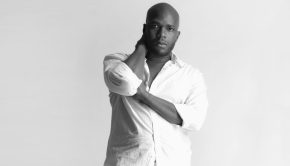Trans model wants you to know the real truth about being trans
With a big spotlight now being put on the trans community and tv shows , mainstream media and high profile celebs also showing support it’s no surprise that a lot of the attention has brought good and bad to the community itself. My personal stance is that every journey is difficult and there are many parts of the steps taken in said journey that the public can miss.
Which brings me to Charlie Poulson, a 24 year old Trans-man with striking features, notably his piercing blue eyes, has an atypical self-made history unlike the famous Caitlyn Jenner or Laverne Cox. Originally from Des Moines, Iowa, Charlie started transitioning from female to male at 19 years old, in a time and place where resources for transgender individuals were few and far between. With a humanistic and personable approach, Charlie paved the way at Iowa State University for other transgender students to be their authentic selves by openly speaking about his transition experiences in both classrooms and media outlets. I sat down with Charlie to talk about how he felt about the Caitlyn Jenner media frenzy along with all the attention the trans community has been given just in recent months and if there was anything the public was missing.
With so much spotlight being put on the trans community what is your stance on the sudden attention?
Part of me feels relieved, that a younger trans kid can look to the media and most likely find a positive representation of what being trans as an adult means. Realizing the profound and sometimes life saving impact this has brings up an even more important viewpoint on what’s happening. The reality of transitioning isn’t always glamorous or easy–it’s a very real game of strategy navigating the society we’re in. Anyone who is looking at the trans community must keep in mind how vast and diverse we are, and that one individual who identifies as trans does not represent us all.
You have a very straight forward approach to your journey. Is there anything you wish you would have known before transitioning?
When I started transitioning, I was a 19 years old and got a majority of my information from other transmen on YouTube. However, I noticed a trend in the consistency of these update videos dropping drastically after getting chest reconstruction surgery they would no longer post updates and that was the end of most resources I could find on transitioning the longer I was on testosterone and the further I was in. While I do find more and more insights and outlets on how to navigate life and society past top surgery, I wish I would have been able to get an accurate perspective on being further transitioned. Things like knowing how to navigate the dating world or what my options are for starting a family could be, or handling legal matters with discriminatory health insurance companies. It’s really the smaller things one might take for granted that become the daily stressors in a trans person’s life.
You’re a model, what’s it like being in this crazy industry and being trans?
It’s a completely different approach from monotonous visuals you’re used to seeing, and transmen are an investment. Generally speaking, the longer we’re on testosterone and keeping ourselves healthy, the more masculine and handsome we get–in my opinion. I used to work in creative departments at advertising agencies, so I’ve seen how particular casting can get for a campaign. I also understand the need for a consumer to see themselves in a campaign and relate to a brand. Trans models positively disrupt the monotonous visuals while simultaneously getting a brand to relate to consumers on a humanistic level. I’ve really enjoyed collaborating with artists as well on personal projects since I’m undoubtedly more of a conceptual thinker.
What advice can you give others who want to break into the industry?
First and foremost, before starting anything I always ask myself “How bad do you want it?” If it’s something I only kind of want, it’s not something I’ll be putting energy towards. My two cents for anything that you do, no matter who you are, is to do something different. The easiest way to do that is by looking to your own personality and doing something that is authentically you, because chances are you aren’t something that’s already been done. I’m to a point in my life where the experiences I’ve been through have sculpted me to be unapologetically true to myself. Being able to think on a creative and business level only works to your advantage to produce genuinely unique and professional results.
What’s the most misconstrued info about being trans that you would like to clear up?
The most common perception I see is the media embedding the idea that trans people are monsters, when in fact, sometime’s we’re just as boring as you are. Living in and transitioning through our current society has given me a thick skin, something that’s come with time, however it brings me a certain peace with myself that doesn’t allow me to put up with those that don’t mean well. I simply feel sorry for those who refuse to educate themselves, and when they’re ready to do so I can only give them the best self-resource out there: Google.
I see that you raised a substantial amount of money for your transition which has been totally left out of the current spotlight. Can you give us an straight forward answer to that reality?
The reality is that transitioning is expensive, both monetarily and mentally. When you don’t have millions of dollars to put into transitioning (which most trans people don’t) you have to not only think of a way to raise the money you need for basic trans healthcare, but also decide on an order of what’s most important. Do you save money for hormones first, or do you raise money for surgery first? Sometimes hormones or surgery aren’t even a consideration, and it’s a case-by-case and personal basis. Something that’s less known to the public is the mess of health insurance only sometimes covering the necessities for their transgender patients. It becomes discriminatory when a cisgender woman (someone who is born female and still identifies as female) is covered for menopause-related hormones but a trans woman is denied estrogen. Our mentality as a society needs to shift from “transgender health care is elective” to “transgender health care is life saving and necessary.” Many trans people, including myself, have experienced doctor visits where the professional that they’re paying to see has absolutely no idea how to treat a transgender patient because “it wasn’t covered in medical school.” I would like to have the peace of mind everyone else has that if I’m in an emergency medical situation that I won’t be in danger because the doctors or nurses simply don’t know what to do.
What’s next for Charlie Poulson?
My main goal is to change the way our culture thinks, expiring the perception that trans people are lesser human beings and reviving the reality that we were once gods and goddesses in ancient times. All while collaborating on timeless work with brands and individuals who are ready to drop the monotony.
Where can people find you on social media etc?
Instagram: @charliepoulson
Twitter: @CharlesPoulson
Facebook: https://www.facebook.com/charlief2m
I have to say I agree with Charlie. I think being very honest about what the journey for transgenders in america needs to be told honestly. Not everyone has media support and an extra 200,000 grand to help them transition once they have made the choice.
Photo Credit: Maro Hagopian
Tweet



































